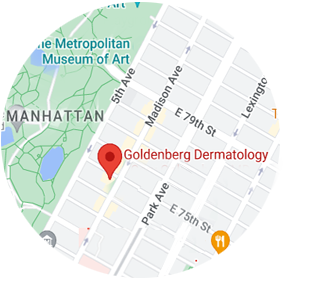Preventing & Treating Dry Skin from Covid-19 Hand Washing
Preventing & Treating Dry Skin from Covid-19 Hand Washing–
Following the health guidelines for avoiding the coronavirus, many people are washing their hands far more than they ever have in their life. But while hand washing helps to prevent the transmission of viruses and bacteria, frequent handwashing can also dry out your skin. And, in the ultimate “Catch 22,” dry skin actually increases your risk of picking up germs.
This is because excessive washing – or sanitizing with alcohol based products – can results in water loss, causing dryness and cracking of the skin, as well as decreased ability of the skin to repair itself. But this does NOT mean you should decrease the frequency or duration of your hand washing!
In this article New York board certified dermatologist Dr. Gary Goldenberg explains 5 things you can do, to prevent dry, cracking or itching skin – while still maintaining the highest standards of sanitizing your hands.
#1. Wash hands with lukewarm water.
By now we all know that the best method of hand sterilization to avoid COVID-19 transmission is to wash with soap and water for 20 seconds or more, while making sure to wash in between the fingers and around the fingernails.
Obviously this also includes always washing your hands after using the bathroom, being in any public place, touching communal objects like doorknobs or light switches, as well as hand washing after blowing your nose, coughing or sneezing.
But, the water you use does not have to be “scalding hot.” Lukewarm water used with soap is sufficient – and it will not dry out the skin as badly as extremely hot water.
#2. Moisturize right after washing your hands.
Keep a container of lotion next to your sink(s) so you can moisturize immediately after washing your hands. Remember to do this while your hands are still slightly damp, to help “lock in” the moisture on the skin.
Follow these steps to wash hands during COVID-19:
- Wash hands with lukewarm water and soap
- Pat dry
- Apply a pea-sized amount of moisturizer, and rub in over both hands
- Apply moisturizer all the way to tips of the fingers, which are most prone to dryness and cracking
#3. Choose the Right Moisturizers
Skin care products are difficult to obtain during the coronavirus situation – so any moisturizer is better than no moisturizer. But, if possible, try to apply moisturizers that contain mineral oil or petroleum to your hands.
Moisturizing ointments and creams – the kind in a tube or jar – are often more likely to be petroleum or oil based – and are therefore more effective than “pump bottle” lotions.
Also, choose fragrance-free and dye-free moisturizers whenever possible, because these are less irritating to the skin. And, for even more relief, apply moisturizers, or a dab of petroleum jelly (such as Vaseline) on your hands before going to bed.
#4. Only Use Sanitizer IF Soap and Water is NOT available
The COVID-19 virus is particularly susceptible to being destroyed by plain old soap and water – so only use hand sanitizer if soap and water aren’t available.
The CDC recommends only hand sanitizers made with 60% or more alcohol as effective to kill coronavirus germs. But alcohol based hand sanitizer is even more drying to the skin than soap. So, after applying hand sanitizer, make sure your hands dry – then apply moisturizer immediately after your hand sanitizer dries.
#5. Consult a Dermatologist for excessively dry, cracked, bleeding or itching skin
If all of the COVID-19 hand washing has dried out your skin to the point of visibly cracking, bleeding or excessive itching, the New York City board certified dermatologists at Goldenberg Dermatology can consult with you via video consultation, and offer prescription products to protect and heal your hands.
Patients with underlying skin conditions, such as eczema or dermatitis, may be particularly prone to skin problems resulting from increased hand washing – and should consult with a dermatologist for diagnosis and treatment.
New York City Dermatologists
Remember that, even if your hands are dried out, it is essential to continue to wash them, in order to destroy and remove harmful bacteria and viruses.
Just follow the tips above, as much as possible, to help eliminate excessively dry or cracked skin. And, if these steps are not enough to treat your dry skin, schedule a video consultation with a board-certified dermatologist at Goldenberg Dermatology in New York City.
In many cases we can offer a prescription cream or ointment that will remedy the problem. And, if your dry skin is a sign of an underlying medical condition, such as eczema, our dermatologists will be able to offer you a proper diagnosis and a treatment plan.











